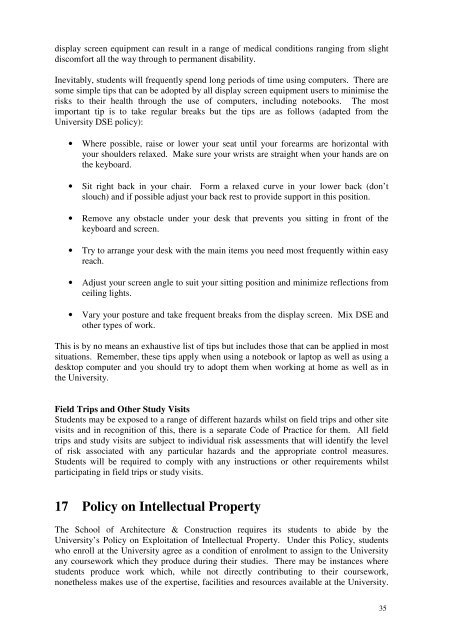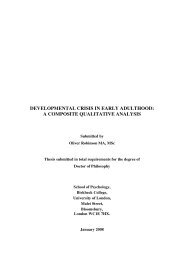student handbook: general information 2010-2011 - University of ...
student handbook: general information 2010-2011 - University of ...
student handbook: general information 2010-2011 - University of ...
You also want an ePaper? Increase the reach of your titles
YUMPU automatically turns print PDFs into web optimized ePapers that Google loves.
display screen equipment can result in a range <strong>of</strong> medical conditions ranging from slight<br />
discomfort all the way through to permanent disability.<br />
Inevitably, <strong>student</strong>s will frequently spend long periods <strong>of</strong> time using computers. There are<br />
some simple tips that can be adopted by all display screen equipment users to minimise the<br />
risks to their health through the use <strong>of</strong> computers, including notebooks. The most<br />
important tip is to take regular breaks but the tips are as follows (adapted from the<br />
<strong>University</strong> DSE policy):<br />
• Where possible, raise or lower your seat until your forearms are horizontal with<br />
your shoulders relaxed. Make sure your wrists are straight when your hands are on<br />
the keyboard.<br />
• Sit right back in your chair. Form a relaxed curve in your lower back (don’t<br />
slouch) and if possible adjust your back rest to provide support in this position.<br />
• Remove any obstacle under your desk that prevents you sitting in front <strong>of</strong> the<br />
keyboard and screen.<br />
• Try to arrange your desk with the main items you need most frequently within easy<br />
reach.<br />
• Adjust your screen angle to suit your sitting position and minimize reflections from<br />
ceiling lights.<br />
• Vary your posture and take frequent breaks from the display screen. Mix DSE and<br />
other types <strong>of</strong> work.<br />
This is by no means an exhaustive list <strong>of</strong> tips but includes those that can be applied in most<br />
situations. Remember, these tips apply when using a notebook or laptop as well as using a<br />
desktop computer and you should try to adopt them when working at home as well as in<br />
the <strong>University</strong>.<br />
Field Trips and Other Study Visits<br />
Students may be exposed to a range <strong>of</strong> different hazards whilst on field trips and other site<br />
visits and in recognition <strong>of</strong> this, there is a separate Code <strong>of</strong> Practice for them. All field<br />
trips and study visits are subject to individual risk assessments that will identify the level<br />
<strong>of</strong> risk associated with any particular hazards and the appropriate control measures.<br />
Students will be required to comply with any instructions or other requirements whilst<br />
participating in field trips or study visits.<br />
17 Policy on Intellectual Property<br />
The School <strong>of</strong> Architecture & Construction requires its <strong>student</strong>s to abide by the<br />
<strong>University</strong>’s Policy on Exploitation <strong>of</strong> Intellectual Property. Under this Policy, <strong>student</strong>s<br />
who enroll at the <strong>University</strong> agree as a condition <strong>of</strong> enrolment to assign to the <strong>University</strong><br />
any coursework which they produce during their studies. There may be instances where<br />
<strong>student</strong>s produce work which, while not directly contributing to their coursework,<br />
nonetheless makes use <strong>of</strong> the expertise, facilities and resources available at the <strong>University</strong>.<br />
35
















